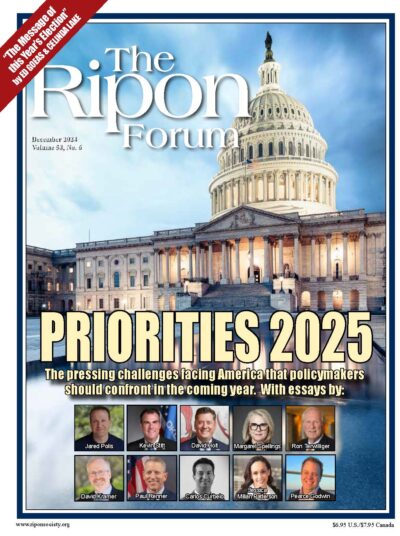
As Republicans prepare to assume unified control of Washington next month, it isn’t too early to start thinking about the 2026 midterm elections. Incoming and returning Members of the U.S. House who were elected by close margins are already raising funds to prepare for the next battle. Republicans — already anxious about their razor thin majority — should take a quick pause to look back at how recent history might offer some insights, lessons, and guidance on how to proceed in the 119th Congress.
The last three times political parties have won trifectas in Washington, they have experienced the wrath of voters in the subsequent election. In 2010, President Obama and his party were victims of a historic “shellacking” in the midterms — one of the most sweeping GOP waves in American history. In 2018, House Republicans were swept out of power by the suburban blue wave. And while the highly anticipated red wave of 2022 ended up being more of a ripple, it pushed Nancy Pelosi off the Speaker’s rostrum and broke Democratic hegemony in the nation’s capital.
Is this just a byproduct of an evenly divided nation and of the natural voter intensity advantage benefiting the party out of power? That’s certainly part of it, but if that were the only explanation it would mean political leaders have no agency and that their actions are inconsequential. A closer look reveals a clear commonality in the conduct of the party exercising full control of government and shortly thereafter getting a pink slip from voters.
A closer look reveals a clear commonality in the conduct of the party exercising full control of government and shortly thereafter getting a pink slip from voters.
In 2009 and 2010, Democrats worked unilaterally to overhaul the nation’s healthcare system, advancing the Affordable Care Act — later dubbed “Obamacare.” The ACA was extremely unpopular when it was born. That same Congress attempted to advance — again unilaterally — an ambitious cap-and-trade bill (Waxman-Markey). Voters reacted angrily in the next election and delivered the House to John Boehner’s Republicans.
Donald Trump’s MAGA sweep in 2016 yielded overly ambitious Republicans. They passed the Tax Cuts and Jobs Act — a complete overhaul of the U.S. tax code — with only GOP votes. However, what really angered voters was their misadventure to “repeal and replace” Obamacare. Not only did Republicans fail to repeal a law that by that time had already been accepted and embraced by most Americans, they also lost some 40 House seats in the fall of 2018. Nancy Pelosi was reinstalled for a second stint as Speaker.
Our last example is the Democratic sweep of 2020. Right out of the gate, Joe Biden and company passed a nearly $2 trillion “Covid relief” package without a single Republican vote, surely contributing to the inflationary pressures the country would start experiencing just months later. Then, in 2022, Democrats again took a go-it-alone approach to the so-called Inflation Reduction Act: massive legislation including health care policy, an expansion of the IRS, and tax provisions intended to raise revenue and fund clean energy investment. Shortly thereafter, Kevin McCarthy’s House Republicans dethroned Pelosi in the fall of 2022.
The instrument used by both parties to pass all of these bills? Reconciliation – which, ironically, is a legislative process designed to exclude the minority party from having any input. There is nothing conciliatory about it.
How congressional Republicans proceed in the 119th Congress – and, specifically, how they use “reconciliation” – will determine whether or not their majorities will be lasting. “Change” elections are not always a guarantee. If we look back at history, parties were able to control chambers for extended periods of time.

How congressional Republicans proceed in the 119th Congress – and, specifically, how they use “reconciliation” – will determine whether or not their majorities will be lasting.
Now, looking ahead, Republicans certainly have opportunities to safely go on offense in the new Congress. Immigration is an obvious example. This is President-elect Trump’s strongest issue. Democrats have no choice but to come to the table and compromise after having lost so much credibility. Immigration offers Republicans an opportunity to both appeal to their base by aggressively moving to secure the border and removing criminal aliens, while growing their coalition among those more skeptical of the GOP by delivering permanent legal status to “Dreamers.” This would really force Democrats to the table. As long as the Administration avoids overly aggressive policies, such as the family separations of 2017, the GOP has a lot to gain from meaningfully addressing immigration.
The other clear mandate for Trump and the GOP is on inflation and the economy. Here, Congress’ big opportunity is in extending the Tax Cuts and Jobs Act of 2017. Despite Democrats’ relentless attacks over the last seven years, the TCJA was not a tax cut only for the wealthy. It was a tax cut for all Americans and for all American businesses. That doesn’t mean the law was universally appreciated by the American public. but without question policies like the expansion of the standard deduction, doubling of the child tax credit, expensing benefits for small businesses, and reduction of individual rates for all Americans were well-received. Republicans will move aggressively to renew the 2017 bill, and if they’re smart, they will invite Democrats to join them in helping address the higher cost of living that has frustrated so many Americans in recent years.
The potential peril for Republicans lies in using reconciliation to advance unpopular policies or to attack popular policies passed by previous Congresses. If we are looking for parallels, in the next Congress the equivalent of the ACA is the Inflation Reduction Act. While rolling back the Democrats’ generous funding for IRS tax auditors is something most Americans would likely accept, canceling clean energy tax credits that are creating jobs and opportunity all over the country — especially in conservative areas — would surely be punished by voters in the next election.
If reconciliation is used wisely to address the American people’s priorities in a manner that unites the country, Republican Senators and House Members need not meet the fate of their predecessors in 2010, 2018, and 2022. With a second term President, Republicans truly have an opportunity to unite the country, lower the temperature in our politics, show real progress on major challenges facing the nation, and build lasting Congressional majorities, affording them the opportunity to continue shaping the future.
Carlos Curbelo represented Florida’s 26th District in the U.S. House of Representatives from 2015 to 2019. He is the co-founder of Vocero, a communications and strategic consulting firm.




